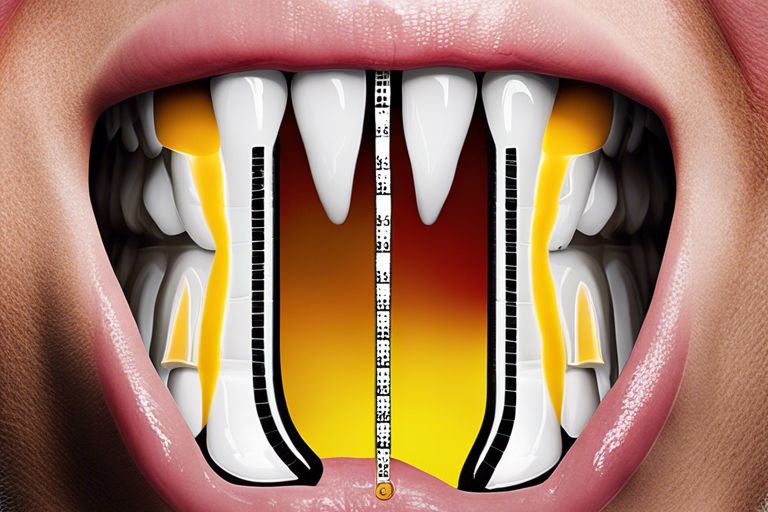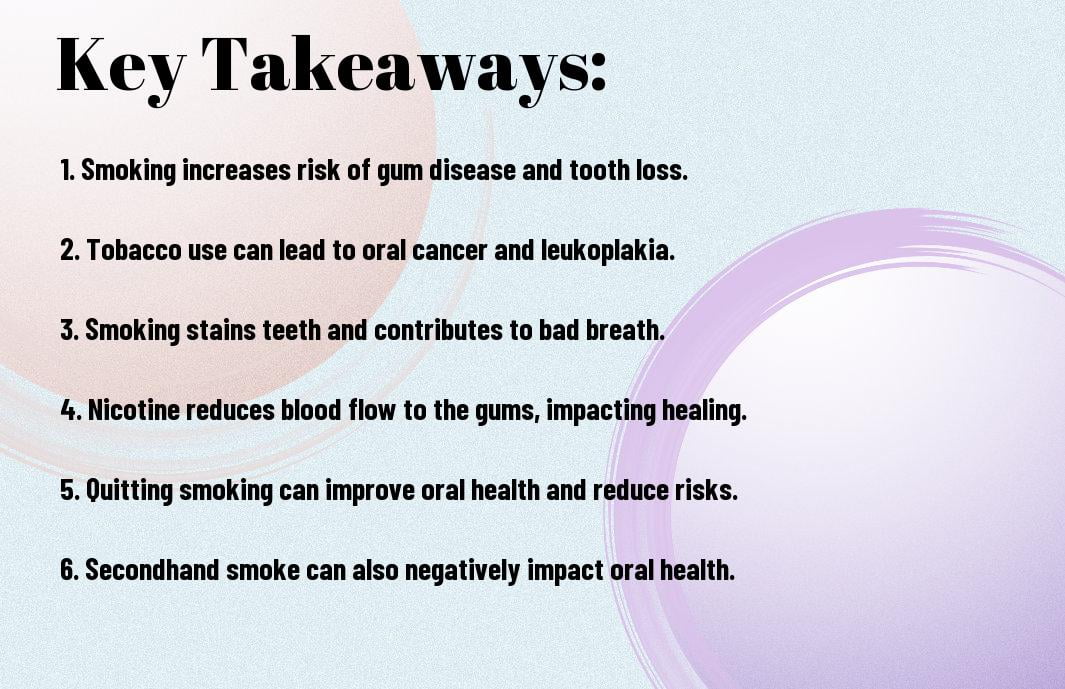Are you aware of the profound impact smoking can have on your oral health? It’s not just about yellowing teeth and bad breath – smoking can lead to serious and life-threatening oral health issues. From an increased risk of gum disease and tooth loss to oral cancer, the effects of smoking on your mouth are significant and dangerous. Understanding the connection between smoking and oral health is crucial for making informed decisions about your habits and prioritizing your oral well-being. In this informative blog post, we’ll explore the link between smoking and oral health issues, and provide you with the knowledge you need to protect your smile.
Key Takeaways:
- Smoking can lead to severe oral health issues: Smoking is linked to various oral health problems such as gum disease, tooth decay, oral cancer, and bad breath.
- Nicotine and tar damage oral tissues: The chemicals in tobacco products can harm the tissues in the mouth, leading to infections, inflammation, and even tooth loss.
- Smoking negatively impacts oral healing: Smokers have a harder time recovering from oral surgeries, such as tooth extractions, dental implants, and periodontal treatments.
- Quitting smoking can improve oral health: Stopping smoking can reverse some of the damage done to the mouth and improve the overall health of the gums and teeth.
- Regular dental care is crucial for smokers: Smokers should prioritize regular dental check-ups and cleanings to monitor their oral health and catch any issues early on.
The Impact of Smoking on Oral Tissues
Assuming you are well-aware of the detrimental effects of smoking on your overall health, it is important to also understand the significant impact that smoking can have on your oral tissues. According to How smoking affects your oral health, smoking not only stains your teeth and causes bad breath, but it also affects the health of your oral tissues in numerous ways.
Oral Mucosa Alterations
Your oral mucosa, which lines the inside of your mouth, is particularly vulnerable to the effects of smoking. The toxins in cigarette smoke can irritate and damage this delicate tissue, leading to an increased risk of developing oral lesions and potentially even oral cancer. Additionally, the decreased blood flow to the oral mucosa caused by smoking can impair wound healing and increase your susceptibility to infections.
Effects on Salivary Gland Function
Smoking can also significantly impact the function of your salivary glands, which are responsible for producing saliva to keep your mouth moist and aid in digestion. Smoking can reduce the production of saliva, leading to a condition known as dry mouth. Not only does this make it more difficult for you to chew and swallow food, but it also increases your risk of developing tooth decay and gum disease. Without adequate saliva to neutralize acids and remove food particles, your oral health can suffer significantly.
It is important to understand the ways in which smoking can impact the health of your oral tissues, including alterations to the oral mucosa and effects on salivary gland function. These changes can have a significant impact on your overall oral health and increase your risk of developing serious conditions. By quitting smoking, you can significantly improve the health of your oral tissues and reduce your risk of developing oral health issues. It’s never too late to make a positive change for your oral health.
Smoking-Related Oral Health Conditions
After years of research, it has become clear that smoking is not only detrimental to your general health, but it also has a significant impact on your oral health. There are several smoking-related oral health conditions that you should be aware of, as they can have serious implications for your overall well-being.
Periodontal Diseases and Smoking
When it comes to periodontal diseases such as gingivitis and periodontitis, smoking can wreak havoc on your oral health. Smoking weakens your immune system, making it harder for your body to fight off infections, including those in your gums. This weakens the gums, making them more susceptible to infection and disease. What’s more, smoking can also hinder the effectiveness of periodontal treatments, making it harder for you to combat these conditions if you are a smoker.
Oral Cancers and Precancerous Lesions
Perhaps one of the most alarming smoking-related oral health conditions is the heightened risk of developing oral cancers and precancerous lesions. Research has shown that smokers are at a significantly higher risk of developing these conditions compared to non-smokers. In fact, approximately 90% of people with oral cancer are smokers. Not only does smoking increase your risk of developing these conditions, but it also makes it harder for your body to heal and recover from them. Quitting smoking is one of the most impactful ways to reduce your risk of developing oral cancers and precancerous lesions.
Effects of Smoking on Dental Treatments
Not only does smoking harm your oral health, but it can also have a significant impact on dental treatments. The chemicals in tobacco can interfere with the healing process and increase the risk of complications during and after dental procedures. This can have serious implications for your overall oral health and the success of your dental treatments.
Healing Complications Post-Dental Procedures
When you smoke, the blood flow to your gums and oral tissues is reduced, making it harder for your body to heal after dental procedures. This can lead to delayed healing, increased pain, and a higher risk of infection. Smoking can also compromise the effectiveness of certain medications used during the healing process, further complicating your recovery.
Influence on Dental Implant Success Rates
Smoking has been shown to have a negative impact on the success rates of dental implants. The chemicals in tobacco can interfere with the integration of the implant with the surrounding bone, leading to a higher risk of implant failure. Additionally, smoking increases the risk of developing peri-implantitis, a serious inflammation of the tissues surrounding the implant, which can ultimately lead to implant failure.
Strategies for Combating Oral Health Issues in Smokers
Your oral health is closely linked to your habit of smoking. However, there are strategies you can implement to combat the oral health issues associated with smoking. By taking proactive steps, you can minimize the negative impact of smoking on your oral health.
Smoking Cessation Programs and Oral Health Promotion
One of the most effective ways to combat oral health issues related to smoking is to participate in smoking cessation programs. These programs not only help you quit smoking but also provide valuable information on how smoking affects your oral health. By quitting smoking, you significantly reduce your risk of developing oral health problems such as gum disease, oral cancer, and tooth loss. Additionally, oral health promotion campaigns specifically designed for smokers can help raise awareness about the importance of maintaining good oral hygiene and seeking regular dental check-ups.
Innovations in Dental Care for Smokers
Advancements in dental care have led to innovations specifically tailored to the needs of smokers. Dentists now have access to specialized treatments and tools that can address the oral health challenges faced by smokers. For example, there are toothpaste and mouthwash products formulated to combat the effects of smoking, such as targeting stain removal and reducing bacteria associated with smoking-related oral health issues. Additionally, dentists can provide targeted interventions to help maintain and improve oral health, such as professional cleanings and oral cancer screenings. By taking advantage of these innovations, you can better protect your oral health as a smoker.
Conclusion: The Connection Between Smoking And Oral Health Issues
Upon reflecting on the various ways in which smoking can negatively impact your oral health, it is clear that the two are closely linked. From stained teeth and bad breath to an increased risk of gum disease and oral cancer, the harmful effects of smoking on your mouth and overall oral health are undeniable. Quitting smoking and seeking proper dental care are crucial steps in preserving the health of your teeth, gums, and mouth. By breaking the habit, you can significantly reduce your risk of developing oral health issues and improve the overall condition of your mouth. Remember, your oral health matters, so make the choice to prioritize it by quitting smoking and seeking the necessary dental care.
FAQ
Q: What are the oral health issues associated with smoking?
A: Smoking is linked to various oral health problems, including bad breath, stained teeth, gum disease, and a higher risk of oral cancer. It can also lead to slower healing after dental procedures and contribute to the loss of bone within the jaw.
Q: How does smoking impact gum health?
A: Smoking contributes to gum disease by weakening the immune system, making it harder for the body to fight off infection. It also reduces blood flow to the gums, which impairs their ability to heal. This can lead to severe gum issues such as periodontitis and eventual tooth loss.
Q: Can smoking cause oral cancer?
A: Yes, smoking is a major risk factor for oral cancer. It can affect the lips, mouth, throat, and esophagus. The harmful chemicals in tobacco products can damage the cells in the mouth and throat, leading to the development of cancerous tumors. It is crucial for smokers to undergo regular oral cancer screenings to detect any potential issues early.







